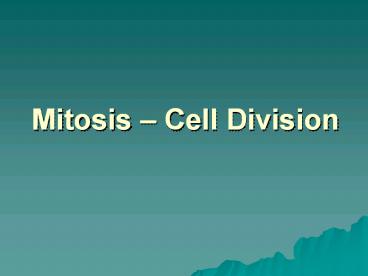Mitosis - PowerPoint PPT Presentation
1 / 52
Title: Mitosis
1
Mitosis Cell Division
2
- All living things start life as a single cell.
- As an organism grows, the cells increase in
number, not size.
3
- The cell grows and eventually splits in two.
- Why are there limits on cell size?
4
- 1. The larger the cell becomes, the more demands
the cell places on its DNA.
5
- 2. The cell has more trouble moving enough
nutrients and wastes across the cell membrane.
6
Reasons for Cell Division
- Growth
- Repair
- Reproduction
- Asexual (binary fission)
- Sexual (fusion)
7
Surface Area to Volume Ratio
- As the length of a cell increases, its volume
increases faster than its surface area.
8
- This makes it more difficult to move needed
materials in and wastes out.
9
- So, the cell must divide!
10
- Mitosis is the process by which the nucleus of a
cell divides to produce two nuclei.
11
- Each nuclei has the same type and number of
chromosomes that the original cell had.
12
- In order to divide, the cell, must follow a cell
cycle. - The cell cycle is a continuous process.
13
(No Transcript)
14
Periods of the cell cycle
- Most cells spend about 90 of their time in
interphase and about 10 of their time in mitosis
and cytokinesis.
15
- The two main parts of the cell cycle are cell
growth and cell division.
16
- Cell growth interphase - is the longest
process. - The cell grows and duplicates the chromosomes.
17
Animal Cell
- Interphase
18
Plant Cell
- Interphase
19
- The second main part of the cell cycle is cell
division which is called mitosis.
20
- The phases in mitosis are prophase, metaphase,
anaphase and telophase.
21
- PMAT Paul made a tower.
- Prophase, metaphase, anaphase, telophase
22
PROPHASE
23
Animal Cell
- Prophase
24
- Prophase is the first stage of mitosis in which
the nuclear membrane breaks down and the
chromosomes become short and thick.
25
- Individual chromosomes are visible as two
parallel threads attached at a point called the
centromere.
26
- Each thread is called a chromatid.
27
METAPHASE
28
Animal Cell
- Metaphase
29
- Parallel fibers called spindle fibers appear.
- These attach to each chromosome on either side of
its centromere.
30
- The chromosomes line up at the center or
equator of the cell.
31
ANAPHASE
32
Animal Cell
- Anaphase
33
- Anaphase is the shortest stage of mitosis and is
the separation of the chromosomes.
34
- The chromatids that were attached to the same
centromere now separate and move to opposite
poles of the spindle.
35
- Now each structure is considered a separate
chromosome because it has its own centromere.
36
- The chromosomes have been separated into two
genetically identical nuclei.
37
TELOPHASE
38
Animal Cell
- Telophase
39
- Telophase seems to be prophase in reverse.
- The spindle fibers disappear, a nuclear membrane
40
- forms around each of the two sets of chromosomes,
and a nucleoli appears in each new nucleus.
41
- The chromosomes become longer.
42
CYTOKINESIS
43
Animal Cell
- Cytokinesis
44
- The final stage of the division of cells, is
cytokinesis.
45
- Cytokinesis splits the cytoplasm of dividing cell
into daughter cells.
46
- Thanks goes to Prince Georges County Framework
for Learning website for pictures and information.
47
- Mitosis Animations
- Cells Alive
48
- How do cells stop dividing?
- When cells come into contact with other cells,
they stop growing. This is called contact
inhibition.
49
- A protein called CYCLIN regulates the timing of
the cell cycle.
50
Rates of Cell Growth
- Varies by organism and within organism
- Bacteria vs. mammal
- Skin vs. liver
- Dependent upon environmental conditions.
51
- What happens if a cell looses control of its
growth? - Cancer Cancer cells do not respond to signals
that control growth.
52
CANCER































